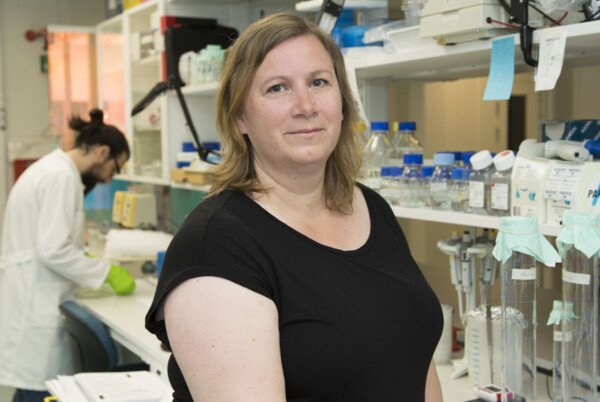The genetic mechanisms of ageing
Maria Eriksson has discovered the gene that causes premature ageing in children. She is now researching the general genetic causes of ageing and has shown, amongst other things, that our stem cells gather more mutations during our lives than previously known.

What are you researching?
“I am studying genetic mechanisms for ageing. We recently showed that stem cells in the muscles of healthy elderly people contain an unexpected number of mutations. There may be thousands of changes in the DNA in a single cell. We can also see clear patterns in this mutation load, as it is known, where certain regions of the genome are more protected. We are now working on publishing similar results for kidney, fat and skin stem cells.
Another line of research is studying by experiment how the disease progeria, premature ageing, expresses itself in cells in the skeleton, blood vessels, fat and skin. I have been researching progeria for a long time and discovered the genetic causes of the disease in 2003. We are now using progeria as a model to help us understand the mechanisms of ageing.”
What is the next step in your research?
“We believe that the mutation load that we have demonstrated is of great significance for the function of cells – but so far this is only a hypothesis; we still need more evidence. One interesting aspect is that there are very different mutations in adjacent cells, because they are not inherited but have been acquired at different times during life. We must study this much more to understand what this means.”
Could this knowledge lead to healthier ageing?
“Absolutely! If the large number of mutations is significant for health, it will be very interesting to investigate how this mutation load can be prevented or reduced. There could, for example, be a future treatment to stop the body’s own mechanisms for repairing damaged DNA from deteriorating as we become older. It is also possible that we may understand more about the different factors that contribute to health. We are preparing for a new study to try to find out if there is a connection between exercise and lower mutation load.”
Text: Anders Nilsson, first published in the booklet From Cell to Society 2018
About Maria Eriksson
Professor of Molecular Genetics, specialising in ageing at the Department of Biosciences and Nutrition
Maria Eriksson was born in Luleå in 1972. She studied molecular biology at Umeå University, graduating in 1996 and received her doctorate in neurology at Karolinska Institutet in 2001. From 2001 to 2003, Eriksson was a postdoctoral researcher at the National Institutes of Health (NIH) in Bethesda, Maryland, USA. She then returned to KI, where she began to build up her own research group. From 2005 to 2008, she was an assistant professor financed by the Swedish Research Council.
Maria Eriksson became an associate professor in 2010, and since 2015 has been the deputy head of the Department of Biosciences and Nutrition. She also researches part time at NIH, where she has had a special volunteer appointment since 2012. Maria Eriksson was appointed Professor of Molecular Genetics, specialising in Ageing, at Karolinska Institutet on 22 December 2017.
